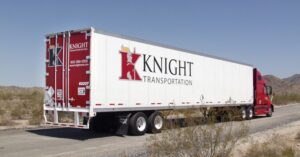When it comes to operating your own trucking business, being a great driver isn’t enough. It takes more than driving skill to profitably manage a business. Successful owners know the various tasks necessary to keep the business running. They also know their limitations.
For example, some owner-operators perform all the maintenance on their equipment. Everything from oil changes to engine rebuilds become do-it-yourself projects accomplished by the owner’s hand. Others, however, leave the wrenching to the professionals — or they handle the grease and oil but trust any projects requiring more knowledge or equipment to a local shop.
When it comes to the cash flow of a trucking business, factors could be considered “money mechanics.” They understand the tasks of billing and collection, and can help truckers stay focused on serving their customers by handling some of the business duties the driver may not be comfortable with or have time to handle.
It doesn’t matter how good the shipping service is if the trucker isn’t paid for it. After the delivery, the factor takes care of invoicing the customer and collecting payment. It may seem like an easy task, but owners who are on the road can’t always find time to complete an invoice and send it to the customer.
And there’s more.
Each open invoice must be tracked to make sure payment is received. After a period of time, another invoice needs to be sent, or the customer called, or both. If the customer still doesn’t pay, collection actions may be necessary. It can be a lot to keep track of while still performing driver duties.
Even when the customer pays, it still takes time. Many businesses operate on a 30-day payment cycle, meaning the driver waits a month before payment is received. Others may have a 45- or 60-day cycle, making the wait even longer. Then, there are those that aren’t very good at keeping bills paid. They can lose invoices, forget payments and otherwise cause extra collecting effort.
Factors not only keep track of all this; they can help with the waiting, too. That’s because most factors advance the payment to the trucking business. Some pay within hours of delivery, keeping cash flowing through the trucking business. The factor waits for payment, not the trucker.
When considering a factoring service, when and how payments are made is an important detail. Options can include direct deposit into the trucker’s bank account, the assignment of funds to a fuel card or a prepaid debit card, or even mailing a check. As for the conditions for making payment, most factors are able to pay upon receipt of a photo of the paperwork. Those that require faxing or mailing of documents are behind the times.
If the customer never pays, the trucker may have to pay back the advanced funds, but there’s a choice here, too. Factors often offer “recourse” or “nonrecourse” services. In nonrecourse agreements, the factor takes the loss if the customer doesn’t pay.
Factoring service fees vary among businesses offering the service and are an important consideration when choosing a factor. In most cases, the factor simply keeps a percentage of the invoiced amount, or a flat fee plus a percentage. The fee goes up if the agreement is for nonrecourse billing, because the factor is assuming greater risk.
Factors can also help the trucker decide which customers to accept. A great freight rate may look attractive, but if it comes from a shipper with a poor history of paying, the deal might not be so good. Factors can often help identify which shippers have poor payment histories, bad credit records and more. They can advise drivers about which customers to avoid, which take a long time to pay and so on.
In cases where a shipper has failed to pay in the past, the factor may simply decline to advance any funds based on the load; this action protects both trucker and the factor.
It’s important to ask the factor whether they allow “spot” factoring. Some factors require the trucking business to use their services for all loads they haul. However, some trucking businesses have certain customers that are very good about paying on time. In these cases, the owner may want to deal directly with the customer, avoiding the additional step and expense of involving a factor. They might prefer using the factor for loads from new or occasional shippers they haven’t established a relationship with.
Ancillary services are another area to ask a prospective factor about. Most factoring businesses offer additional services, either directly or through partnerships with other businesses. Free credit checks are one such service; fuel cards are another.
Some owner-operators carry large amounts of cash for fuel purchases, while others use credit cards that charge high interest rates if the bill isn’t paid off by the due date. Factoring services can offer fuel cards with smaller fees and no interest, saving money and keeping the businesses debt down. In some cases, fuel cards come with discounted pricing on fuel, oil, tires and other items and services.
Some factors can assist with emergency cash needs, too. Expensive repairs, such as an engine rebuild, can sideline a trucking business if the owner can’t fund the work. Some drivers turn to predatory lenders who offer quick cash, sometimes in a single day. Often, these lenders charge exorbitant fees along with high interest rates. Some lenders insist on access to the business bank account so they can make withdrawals without the owner’s input.
Factors may provide low- or no-interest solutions to help owners get the business back up and running. Others partner with firms that help manage programs to keep the business viable.
Anyone doing business with a factor should carefully read the agreement paperwork. Some factors impose fees for certain actions — including a fee to terminate the agreement. It’s best to understand all rates and fees from the beginning of the relationship.
Factors can smooth out cash flow for trucking businesses, allowing the owner to concentrate on the business of moving freight. Factors can also help owner-operators make sound business decisions and can help when things go wrong.
Cliff Abbott is an experienced commercial vehicle driver and owner-operator who still holds a CDL in his home state of Alabama. In nearly 40 years in trucking, he’s been an instructor and trainer and has managed safety and recruiting operations for several carriers. Having never lost his love of the road, Cliff has written a book and hundreds of songs and has been writing for The Trucker for more than a decade.







